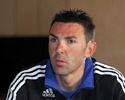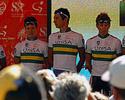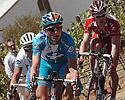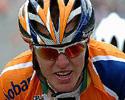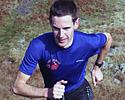First Edition Cycling News, January 23, 2008Edited by Ben Abrahams & Laura Weislo CONI wants two-year ban for Mazzoleni
The Italian Olympic Committee (CONI) released a statement on Tuesday calling for Eddy Mazzoleni to serve a two-year ban for his involvement in the 'Oil for drugs' scandal. The charges against Mazzoleni relate to SMS messages sent to Italian doctor Carlo Santuccione in 2004, said to contain requests for banned substances and treatments. The Italian cycling federation will now decide whether to accept CONI's recommended sanction for the 34 year-old Italian. Mazzoleni, who finished third in last year's Giro d'Italia, was suspended by his Astana team in August pending the outcome of CONI's enquiry in which he reportedly refused to cooperate with anti-doping prosecutor Ettore Torri. Mazzoleni denied rumours of his retirement in August, but is still without a professional contract for 2008. 2007 Giro d'Italia winner Danilo Di Luca was banned for three months in October for his involvement in the same affair, but always denied any wrongdoing. The UCI subsequently removed Di Luca from the ProTour rankings, handing the series victory to Australian Cadel Evans. In Tuesday's statement, CONI also recommended that Domenico Quagliariello, formerly of Ceramica Flaminia and now with Italian amateur team Centri della Calzatura, be handed a life-time ban for his part in the 'Oil for Drugs' affair, since it was the 28 year-old's second doping offence. Redant: Non ProTour teams are good for the raceBy Paul Verkuylen in Adelaide
Speaking to Cyclingnews as he sped towards the finish of stage one at the Tour Down Under, Silence-Lotto directeur sportif Hendrick Redant spoke openly about his thoughts of having a national team competing alongside those from the ProTour. "I think that it is good to have them here [UniSA-Australia]. It gives those riders a race in their home country where they can show themselves," Redant explained. "It's a shame as well that those guys with the kangaroos on their jerseys [SouthAustralia.com-AIS] aren't here either. Those guys are good, I first spotted Matt [Lloyd] here two years ago," he said.
Redant understands this importance and sees Australia as a breeding ground of some of the best talent in cycling at the moment. He has a high regard for the coaching system that has been implemented, believing it to be one which many other countries, including Belgium, could learn from, and sees the local teams as an important part in the development of the sport in Australia. "It would be good to have a few more teams here like them, I think it's good," he concluded. UCI vs. Grand Tour war spills over to European federationsBy Laura Weislo The UCI's ProTour series opened in Australia this week, and with the start of the contentious calendar comes another round of conflict between the sport's governing body and the Grand Tour organisers. While the races run by Amaury Sport Organisation (ASO, France), RCS Sport (Italy) and Unipublic (Spain) may no longer be part of the ProTour calendar, the change in status has continued to generate tension. UCI president Pat McQuaid reportedly sent a letter to six European countries' cycling federations who have taken the side of the organisers, threatening to exclude their athletes from the World Championships if the federations were to sanction events promoted by the three Grand Tour organisers. Agency France Presse reported that the letter, dated January 15, was sent to the federations of Austria, Belgium, Spain, France, Italy and Luxembourg, the same countries which sent a letter to McQuaid in December stating that they would allow the races to take place under their sanctioning as a reaction to the changes to the UCI's calendar. The federations could be called on to sanction races such as Liège - Bastogne - Liège, Paris-Roubaix, Milan-Sanremo and the Giro di Lombardia among others, on top of the Giro d'Italia, Tour de France and Vuelta a España. If the races were to run under the guise of the national federations, ProTour and Professional Continental riders will not be allowed to compete by the UCI as they are disallowed from entering national races per the governing body's regulations. The new threat of exclusion from the World Championships could affect the Olympic berths of the six countries should their athletes be kept from the competition. The French and Italian federations criticized the UCI for its decision to change the classification of the races, and called for a round table to discuss the situation with all the involved parties. Jean Pitallier, president of the French Cycling Federation (FFC), told AFP that the UCI did not have the "authority to place the competitions of ASO, RCS and Unipublic into classes on a unilaterally chosen calendar since the Federation had not asked, which is the rule of the UCI." McQuaid's letter reportedly opened the door to discussion, stating, "The steering committee will make the decisions it deems necessary, including the possibility of convening an extraordinary congress, as has been suggested by some of its members," he wrote. A long history of conflictThe three organisations which run the events have objected to the UCI's ProTour since its inception in 2004, and have had a long-running battle with the UCI over having their races on the ProTour calendar. They mainly objected to the UCI's rules which forced them to invite all ProTour teams, a particularly contentious rule when the UCI licensed 20 ProTour teams for the 2007 season. The UCI took the events in question off of the ProTour calendar for 2008 as a concession to the organisers, placing them instead on the European calendar or a new class of European calendar which allows the inclusion of more wild card teams. The organisers saw this move as a 'downgrade' in status, and threatened to remove them from the UCI's calendar altogether. A similar situation occurred one year ago when the ASO threatened to hold Paris-Nice under the French federation. The UCI responded by prohibiting ProTour teams from participating in the event. The argument threatened the start of the season, and placed riders in the middle of the two warring bodies. Only an emergency meeting and an interim peace deal allowed the racing to go forward, but clearly without solving the underlying issues. Cyclingnews' recent coverage of the ProTour-Grand Tours split
October 4, 2008 - New ASO chief to maintain values Cyclingnews' complete coverage of the ProTour-Grand Tours split Porte pleased with ProTour debutBy Greg Johnson in Adelaide Australian youngster Richie Porte (UniSA-Australian National Team) is delighted with his ProTour debut, having led a 70 kilometre-long breakaway on the Tour Down Under's opening day. Porte attacked the peloton on the event's opening day today and spent the majority of the stage some six minutes off the front with breakaway companions Dimitri Champion (Bouygues Telecom) and Mickael Buffaz (Cofidis). "It was a lot of fun," said a happy Porte after the stage. "Why not, I've got nothing to lose. We were just rolling along, not much happening, and I asked Matt Wilson what I should do and he said if I wanted to go breakaway then go breakaway. It's great having these guys around to work me up." Porte earned his place in the UniSA-Australian National Team at last weekend's Australian Open Road Championships in Ballarat, Victoria. The composite team's final spot was reserved for the highest finishing Australian - who doesn't already have a professional contract - in the elite men's national championship race. "I feel good, it was never really that hard. The gap went out to six minutes but I think the bunch were sitting up. But it's good, it's a good confidence booster." UniSA-Australian National Team manager Dave Sanders was delighted with the youngster's efforts in the race's opening stage. "I'm pretty proud of him really, he's certainly earned his stripes today," said Sanders. While Porte contemplated that the small break might just be able to hold its margin to the finish line, he admitted to knowing the peloton allowed the riders to take some time. "When we got that close to the finish and we were hovering, and then it came back before going back out I thought it might have a bit of a chance, but what hope do you really have," he said. Porte, who is currently in talks with an Italian amateur team he's previously ridden for, thinks he will continue his day-one tactic throughout the remainder of the race. "I suppose it just depends on the legs, I think I should be right - these guys look after us pretty well so no excuses," he said. Stage 1 was claimed in a sprint victory by Australia's Mark Renshaw (Credit Agricole), after the small break was caught with three kilometres to go. The opening stage marked a special moment in ProTour history, with the stage the series' first to be held outside of European boarders. Champion happy to be in AdelaideBy Paul Verkuylen in Adelaide
Frenchman Dimitri Champion started his season in Adelaide last year before going on to finish second in the time trial at the French championships. This year he is following the same formula, and spent most of the first day in a three-man breakaway. "It's my second time at the Tour Down Under and I can see my form is quite ok again," he said. "I didn't exactly plan to go away today but I followed the move initiated by the Australian rider (Richie Porte). As we were gone, I wouldn't stop and wait for the bunch but I never believed in our possibilities to go for the stage win." Champion, now in his second year with Bouygues Telecom, also spent some time ahead of the field last year, although this year's experience was likely more enjoyable as last year he was away with a group of 19 during stage three in torrential rain. "Today was typical for a ProTour race with many teams chasing for their sprinters. We had no chance to make it but I still wanted to get the jersey for the hotspot sprint, unfortunately Mickaël Buffaz went faster than me on both occasions. Never mind, I'm happy racing here in the sun." William Walker: A tough transition
Quickly snapped up by Rabobank's Continental squad after winning the epic Melbourne to Warrnambool in 2004, William Walker was one of the hottest properties on the amateur circuit. The Australian gradually progressed through the team's higher echelons by riding the 2006 Vuelta a España, but his transition to the professional ranks hasn't been entirely plain sailing as Cyclingnews' Paul Verkuylen found out. By the end of 2005, William Walker already had the kind of results that would convince most other riders to turn professional - notably a second place at the U23 World Road Race Championships in Madrid. And despite comfortably seeing off all comers at the Australian Open Road Championships soon after, Walker elected to remain in the Continental ranks until part-way through the 2006 season, finally notching up his first full season as a pro last year. Walker began the 2007 season in the same way that most professional cyclists do, at the team's official training camp. Usually a time to get re-acquainted with some old friends as well as meet some new ones, the camps also have a serious side as riders put the finishing touches to their pre-season training before heading off to their first races. However, Walker's experience was anything but enjoyable. "I went to the training camp and got absolutely killed," he said. From there, his season was a steady progression, but as so many other riders have experienced before him, making the grade in the professional ranks isn't nearly as straightforward as that of an amateur. "2007 was not the easiest year. It was fairly solid, but a bit intense," he admitted. "From [the training camp] it slowly improved. Every tour that I did, I got better, recovered and trained well and did well in the next one." Continue to the full interview with William Walker. Rob Jebb: Peak performer
British cyclo-cross expert Rob Jebb is one of the sport's unsung heroes. Able to achieve the highest level of several sports all while holding a full-time job takes determination, dedication and a strong passion for sport, as Steve Thomas finds out. Another dark and cold winter's night sets in to the Lake District in Northern England as Rob Jebb tests his lights and pulls on his rain cape and gloves. "I don't mind it (training in the dark of winter). I start work pretty early and finish just as it starts to get dark. I get out on the road in the dark some nights, extend my rides to work some days, and do the dreaded turbo trainer sessions when it's too bad outside." It's the epitome of amateur sport, something seemingly long forgotten in modern day cycling, but despite holding down a full time engineering job with British Telecom, Rob Jebb's sporting performances are anything but amateur, be them on a bike or on foot. To most readers, Rob is known as a cyclo-cross racer and a multiple champion of the infamous Three Peaks Cyclo Cross race, which is revered as the toughest cyclo-cross in the world. "I started cycling because my mates and dad did it. I was always a fell runner, but figured cycling suited me more, and so gave the Peaks a go – they have the fell running version too, and runners always do well in the cross. Plus it was just down the road from home." It was in his late teens that he first tackled the 'Peaks'. "I finished well down the field, but really started to get the bug. I really enjoyed it." Within a few years Rob had progressed towards the podium, and in 2000 he took the first of his record equalling six Peaks titles (Tim Gould also had six wins). "It's always a major thing for me, my years main cycling goal." This year the race did not take place due to potential foot and mouth disease fears, which also halted the 2001 race – arguably preventing Rob taking a staggering eight consecutive victories; "It was disappointing, but understandable – if something did break out it would mean the end of the race for ever." Continue on to the full interview with Rob Jebb. Totschnig to sue German TV stationGeorg Totschnig will sue the German television station ARD for libel and defamation for its broadcast earlier this month claiming he was a blood-doping client at the Viennese blood bank "Humanplasma", even though he knows that "the damage can't be mended.". His attorneys, Barbara Auzinger and Bertram Dietrich, of Vienna, will file suit against the ARD early next week, with additional suits against print media possible later in the week. According to the Austrian press service, APA, Auzinger said that ARD ran its story without giving Totschnig a chance to take a position. The ARD's chief editor has since apologized to the Austrian rider, who retired in 2006. (All rights reserved/Copyright Future Publishing Limited 2008) |

|
January 2009 |
Recently on Cyclingnews.com |

